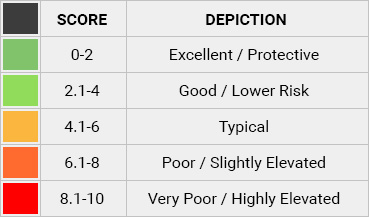Why you need to know about your DNA & how we can help you
DNA is the material that carries all the information about how a living thing will look and function in our body. Understanding this information is known as genomics. Learning and knowing your potential genetic risk factors will empower you to manage your life style and healthcare to help create better healthcare outcomes. Genetic testing has made new potential in health management possible.
Empowering predictive healthcare


What we investigate & how it will help you

We perform a DNA test from your sample

We search your DNA for potential genetic changes, or mutations, that are linked to disease.

We provide a risk assessment report for your healthcare based your DNA
Select and book other DNA reports

Addictions£149.99
We all react differently to substances / drugs. Genetics governs how likely someone is to become addicted to a substance or drug. Even if ingested for medical reasons, it may lead to addiction. This test can provide insights regarding one's tendency to fall prey to them.
Key Benefits:
- Genes influence the numbers and types of receptors in peoples' brains
- How quickly their bodies metabolize drugs
- How well they respond to different medications
Service Features:
- Immediate service
- Cost effective
- Saving time

Allergies £149.99
Allergy is a body's biochemical reaction to a particular allergen. This panel covers genetic risks associated with common allergens. Allergies can be managed by avoiding contact or the consumption of allergens.
Key Benefits:
- Find the exact allergens that trigger allergic reactions
- Create a Manageable Diet
- Determine If Your Allergy Has Been Outgrown
Service Features:
- Immediate service
- Cost effective
- Saving time

Bone Health & Disorders £149.99
Bones play many roles in the body - providing structure, protecting organs, anchoring muscles and storing calcium. Many things can change how our bone health deteriorates some can be rectified, and some may be genetic. Our joints also can be compromised due to lifestyle and lack of nutrition.
Service Features:
- Immediate service
- Cost effective
- Saving time

Cardiovascular £149.99
The cardiology panel investigates the genetics of cardiac health. Arrhythmia and abrupt cardiac arrest are both hereditary events. Knowing the hazards linked with them can help one screen better and avoid the consequences. Heart disease relates specifically to the heart, while cardiovascular disease affects the heart, the blood vessels, or both.
Key Benefits:
- Identify the cause of a family's heart disease
- Help determine which specific relatives are at risk for developing it
Service Features:
- Immediate service
- Cost effective
- Saving time

Circadian Rhythm £149.99
The circadian cycle is a natural, internal process that regulates the sleep-wake cycle and repeats roughly every 24 hours. Understanding your body's natural rhythm based on genetics will be beneficial in planning the fitness schedule, meal schedule, sleep time monitoring, etc.
Key Benefits:
- Help people take medication at the most effective time for their bodies
- Prepare your body for expected changes in the environment
- Prepare your body for the time for activity, sleep, and to eat
Service Features:
- Immediate service
- Cost effective
- Saving time

Dental Diseases £149.99
What is an Oral Bacteria DNA Test? Oral Bacteria DNA testing is an exciting new diagnostic tool used to test a patient's saliva and plaque to determine the specific types of bacteria present in their mouth as well as their genetic susceptibility to certain kinds of tooth decay and gum disease.
Key Benefits:
- Determine the specific bacteria that are present in your gum disease
- Most effective antibiotic to use for your individual case
Service Features:
- Immediate service
- Cost effective
- Saving time

Dermatology £149.99
A dermatologist can diagnose and treat conditions that affect your skin. This includes conditions like plaque psoriasis, rosacea, and acne. A dermatologist can also identify symptoms on your skin that could be signs of other health conditions.
Key Benefits:
- Provide a sense of relief from uncertainty
- Help people make informed decisions about managing their health care
Service Features:
- Immediate service
- Cost effective
- Saving time

Fitness genomics £149.99
The rapidly emerging discipline of exercise genomics increases our understanding of exercise's preventative and therapeutic capabilities by extending our understanding of exercise physiology and human behaviour. This, in turn, assists us in developing training regimens tailored to our body type for the optimum performance results.
Key Benefits:
- Provide a diagnosis for a genetic condition such as Fragile X
- Information about your risk to develop cancer
Service Features:
- Immediate service
- Cost effective
- Saving time

Gastrointestinal Disorders £149.99
GI tract plays the most vital role in acquiring nutrition. Issues pertaining to the gastrointestinal tract can cause a substandard quality of life due to an unhealthy gut. Genetic risks of GI conditions can help one navigate through them with ease.
Key Benefits:
- Many immune and autoimmune gastrointestinal disorders have a genetic component
Service Features:
- Immediate service
- Cost effective
- Saving time

Haematological Disorders £149.99
Hereditary blood disorders are caused by alterations in the production or function of components of the blood, such as red blood cells, white blood cells, or platelets. There are more than 20 million patients living with inherited blood disorders worldwide. Blood disorders can cause various symptoms, such as swelling and redness of extremities (poor blood clot), increased bleeding without significant injury (haemophilia), or pale skin and fatigue (anaemia).
Service Features:
- Immediate service
- Cost effective
- Saving time

Hormonal genomics £149.99
Hormonal genomics points you to your genetic risk factors and helps you mitigate them. Hormonal health is key to the balance of life. Areas of concern for women are general thyroid, PCOS and gestational diabetes. In men, low testosterone and infertility, have an essential genetic component. Understanding your genetic predispositions will aid in managing hormonal conditions.
Key Benefits:
- Analyze levels of key hormones that impact stress, sleep, weight, mood
- Host of other properties that make up our overall health
Service Features:
- Immediate service
- Cost effective
- Saving time

Immunology £149.99
Our immune system is the first line of defence for pathogens coming into the body and autoimmune conditions. Understanding genetic factors impacting immune functions could be of great help in mitigating risks for underlying autoimmune conditions.
Key Benefits:
- Inform you about your genetic risk for various health conditions
- Help to take decisions about the changes in your lifestyle
- To achieve your health and wellness goals
Service Features:
- Immediate service
- Cost effective
- Saving time

Infectious Diseases £149.99
It can be crucial to identify a particular bacterium, its kinds, or subtypes via genetic testing. Certain genetic tests can identify the genes that give microorganisms antibiotic resistance. In order to choose the best drug for therapy, other tests may be used to identify the type (genotype) of virus that is present.
Service Features:
- Immediate service
- Cost effective
- Saving time

IVF & pregnancy loss £149.99
Understanding the genetics and taking necessary actions could lead to successful IVF with less time /money spent. We cover the genetic risks for recurrent pregnancy loss and IVF failure rate for fruitful IVF treatment. The go-to panel before initiating any IVF cycles.
Key Benefits:
- It enables one to detect changes in genes, chromosomes, or proteins
- Ruling out a suspected genetic ailment
- Determine a person's risk of developing or passing on a genetic disorder
Service Features:
- Immediate service
- Cost effective
- Saving time

Lifestyle genomics £149.99
Diabetes, hypertension, obesity, coronary heart disorders and hyperthyroidism are the infamous 'Diseases of our Civilization.' These diseases are highly influenced by an individual's genetic make-up. It is possible to predict susceptibility to these diseases early on in life.
Key Benefits:
- A sense of relief from uncertainty
- A greater understanding of your health & your cancer risk
- Information to help make informed medical & lifestyle decisions
Service Features:
- Immediate service
- Cost effective
- Saving time

Neurology £149.99
Neurogenetics can provide information on genetic conditions affecting the nervous system. To name a few, Autism, Parkinson's Disease, (ADHD), Frontotemporal Dementia and Asperger's Syndrome. Please see the listing below of all conditions.
Key Benefits:
- Especially valuable in establishing diagnoses in symptomatic patients
- Asymptomatic persons at risk for genetic diseases
Service Features:
- Immediate service
- Cost effective
- Saving time

Nutrigenomics £149.99
Nutrigenomics is the integration of diet and genomic science. Simply put, how your genes interact with food has a direct impact on your health. Genomics makes it possible to study DNA, understand predispositions to dietary conditions and manage them early on in life.
Service Features:
- Immediate service
- Cost effective
- Saving time

Opthalmology £149.99
Predictive DNA testing in ophthalmology can help before condition materialise. Your eyes can start to deteriorate and knowing if you have certain DNA traits before could help. When more information is needed, Ophthalmology can help.
Key Benefits:
- Determining the causes of your eye disorders
- Definitive diagnosis is done to manage your eye diseases
Service Features:
- Immediate service
- Cost effective
- Saving time

Personality Traits £149.99
While our surroundings and jobs have an impact on who we are, DNA also significantly affects who we are. You can learn about these parts of yourself and much more in the comprehensive personality report you will receive after taking this DNA test.
Key Benefits:
- Learn about your genetic strengths and weaknesses
- Learn about your agreeableness, openness, extraversion, conscientiousness
- Learn about your neuroticism, altruism, emotional intelligence
Service Features:
- Immediate service
- Cost effective
- Saving time

Pulmonary Disorder £149.99
Pulmonary Lungs are one of the important vital organs of our body. Respiratory disorders such as COPD, ADRS has an inherited genetic component. Lung health impacts a lot of other metabolic functions of the body.
Key Benefits:
- Help your healthcare provider diagnose
- Ecide the treatment of certain lung disorders
- Tests measure lung volume, capacity, rates of flow, and gas exchange
Service Features:
- Immediate service
- Cost effective
- Saving time

Renal Disorders £149.99
Renasight is a test to determine if there is a genetic cause for an individual's kidney disease or if there is an increased hereditary risk due to family history. The test uses a blood or saliva sample to test 385 genes associated with chronic kidney disease.
Key Benefits:
- Renasight test, determine if there is a genetic cause for an kidney disease
- If there is an increased hereditary risk for kidney disease due to family history
Service Features:
- Immediate service
- Cost effective
- Saving time

Vaccinomics £149.99
This test can show the effectiveness and safety of a vaccine. In order to understand why different people respond to vaccinations differently in terms of protection against and spreading it to others, the field of vaccinomics investigates genetic factors.
Key Benefits:
- Vaccines are the way to stop any spread of infections
- Various vaccines elucidate different types of immune responses
Service Features:
- Immediate service
- Cost effective
- Saving time
